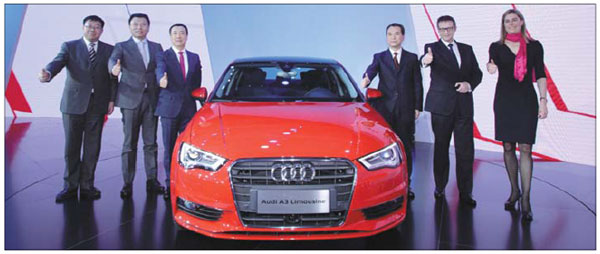Audi looks to drive ahead in challenging Chinese market
German brand feeling confident about growth prospects and position
German premium carmaker Audi AG vows to grow steadily and cement its position in China this year through a series of new vehicle releases, more dealership backing and improved customer experience, amid mounting market and policy challenges.
Ge Shuwen, executive deputy general manager of the Audi sales division at Sino-German joint venture FAW Volkswagen, said last week that the brand expected its 2015 sales in China to rise 10 to 15 percent from 2014.
"We have confidence that we can reinforce our leadership in China's premium car market. We will adjust the full-year target according to our quarterly performance," he said.
The brand's China sales grew by 17.7 percent to 575,077 cars in 2014 from the previous year, which maintained its two-decade-long position as the top premium car provider in the market.
The sales last year grabbed a third of not only China's premium car market but also Audi's global deliveries.
In the same year, Audi's rivals BMW and Mercedes-Benz moved 425,765 and 281,588 units respectively in China.
Zhang Pijie, general manager of FAW Volkswagen, acknowledged that the premium car market in China would be "full of challenges" this year.
"Pressures on the domestic economic downturn will persistit is negative to the premium car market," Zhang said.
He said more cities planning to restrict car purchases and the upcoming new regulations of administration of automobile brand sales would also have an impact on the market.
So far, eight major Chinese cities, including Beijing, Guangzhou and Shenzhen, have restrictions on car purchases.
From the perspective of market competition, Zhang said some premium brands' price cuts for bigger sales volumes were unlikely to end in the near future and could further thin margins.
He predicted that the premium car market in China would grow by 14 percent this year, down from 20 percent in 2014.
Ge said Audi plans to launch 19 new products in China this year, including all-new, modified and yearly upgraded models.
Last week, an imported all-new A3 Cabriolet and two locally made A3 cars hit the market.
An imported all-new Audi TT and Q7 SUV will also be introduced later this year.
One of the top priorities of the brand this year is to explore the small-sized car segment for young buyers, which will be in the fast lane, Ge said.
"We underestimated the potential of the segment before," he admitted.
Ge said Audi would provide more support to dealerships to improve their profit-making capabilities and boost sales.
"Dealerships are our four limbs, and you can image what you can do without the four limbs," he stressed.
He said the company would raise sales rebates for dealerships by 0.5 percent "unconditionally" and will simplify the existing redundant assessment items for them.
Ge said 70 percent of Audi's dealerships in China are in the black. By the end of last year, the brand had 409 dealerships in 178 Chinese cities.
The company revealed last year that the number of its dealerships would grow to 500 by 2017.
Ge said Audi, together with dealerships, would further improve sales and after-sales services to "delight" customers.
"Frankly speaking, customers in China are hard to delight as they are demanding and sensitive. They may even be angry just because our salespeople don't smile," he said.
Ge said the company would also create an "all-powerful" application to communicate with customers.
Michael Renz, the newly appointed general manager of the Audi sales division at FAW Volkswagen, said that customer demand in China changed a lot during the past 10 years.
"Customers now strive for more experience, future orientation, sustainability and safety. At the same time, they focus on fun, design and lifestyle," he said.
He added that there was promising potential growth in the Chinese market as premium car sales account for only 9.4 percent of the overall passenger vehicle market, much lower than 20 percent or more in the mature markets of Europe.
FAW Volkswagen, which has plants in Changchun in the northeast, Chengdu in the west and Foshan in the south, now produces the Audi A6, A4, A3, Q5 and Q3 as well as a slew of Volkswagen models.
Last year, the joint venture sold 1.82 million cars. It aims to move 3 million cars annually by 2020.
gongzhengzheng@chinadaily.com.cn
|
Executives of Sino-German joint venture FAW Volkswagen and its Audi sales division pose at a new product launch ceremony in Beijing last week. photos Provided to China Daily |
(China Daily 02/02/2015 page18)















